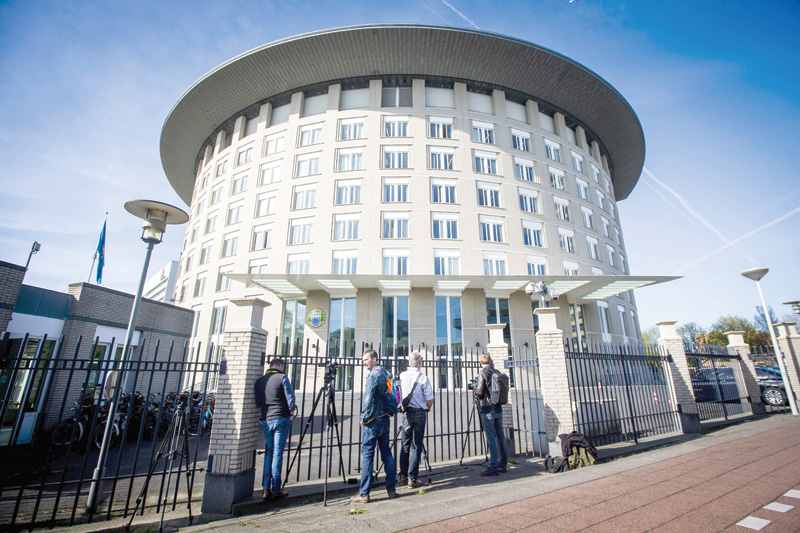

The Hague: Britain accused Russia on Wednesday of breaking the two-decade international ban on chemical weapons, at emergency talks into last month’s poisoning with a nerve agent of a former Russian spy.
The accusations came as diplomats from the Organisation for the Prohibition of Chemical Weapons met behind closed-doors in The Hague to discuss the crisis.
Britain’s broadcasting watchdog meanwhile opened seven impartiality probes concerning Russia’s RT news channel, noting “a significant increase” in programmes warranting investigation since the March 4 poisoning.
OPCW experts last week confirmed the British findings that former Russian double agent Sergei Skripal and his daughter had been sickened by a nerve agent.
Founded in 1997, the OPCW oversees the application of the Chemical Weapons Convention (CWC) aimed at eliminating the world’s stockpiles of toxic arms.
“We will continue to call out Russia’s reckless and indiscriminate behaviour when it violates this Convention, and when it threatens global security,” British Ambassador Peter Wilson told the OPCW.
Called by Britain, it was the second meeting of the body’s executive council in three days. Syria joined the global treaty ban in 2013 and said it had declared all its toxic arms stockpile, which have since been destroyed.
But amid rising accusations that the Syrian regime has maintained a secret weapons programme, the OPCW has becoming increasingly political and divided.
After deploying its experts to Salisbury, the OPCW last week confirmed in a report “the findings of the United Kingdom relating to the identity of the toxic chemical”.
It did not however publicly name the substance nor its origins, which Britain says was a Novichok nerve agent of the sort first developed in the Soviet Union in the 1970s.
Moscow has vehemently denied the allegations, and strongly contested the OPCW’s findings, alleging that they were manipulated as they failed to disclose the presence of the BZ nerve agent, used by the West, in biomedical samples taken from the Skripals.
Wilson hit back however, telling reporters: “BZ wasn’t in the samples, they (the OPCW) were testing. It was in the control samples, meaning that the laboratories were doing their job.”
And he accused the Russians of breaking confidentiality agreements by revealing the name of a Swiss lab.
OPCW chief Ahmet Uzumcu refused to be drawn into the war-of-words, but offered reassurances of “the credibility and integrity of this network” and praising the “impeccable” work done by laboratories around the world to analyse samples.
The Salisbury crisis, coupled with Russian support for its ally Syria after accusations of illicit toxic weapons being used on civilians in its civil war, has sent already-frayed relations between Moscow and the West plummeting to new lows.
On Monday, the OPCW’s governing executive council also met in closed-session to discuss a dangerous mission by its inspectors to the Syrian town of Douma to probe allegations of a chemical chlorine and sarin gas attack on April 7. — AFP
Oman Observer is now on the WhatsApp channel. Click here



